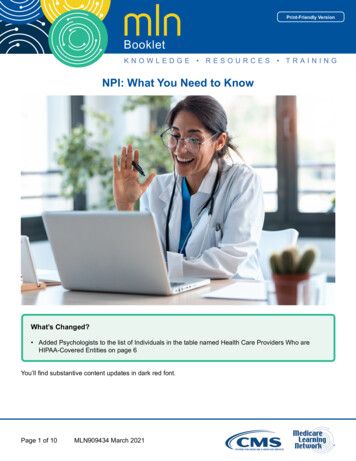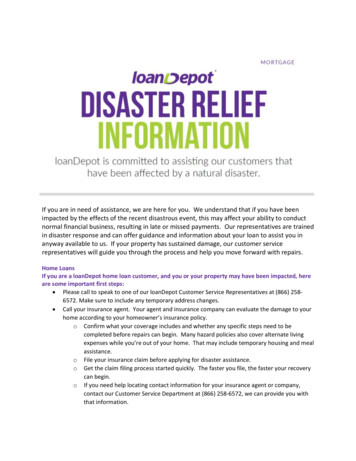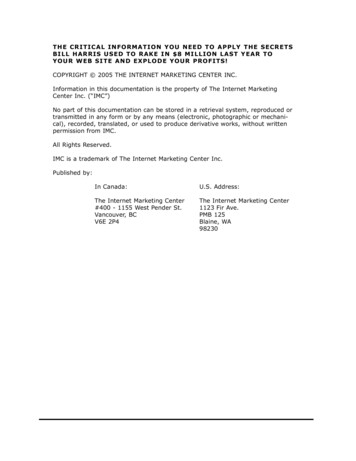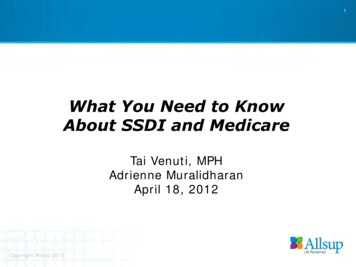
Transcription
Print-Friendly VersionBookletNPI: What You Need to KnowWhat’s Changed? Added Psychologists to the list of Individuals in the table named Health Care Providers Who areHIPAA-Covered Entities on page 6You’ll find substantive content updates in dark red font.Page 1 of 10MLN909434 March 2021
NPI: What You Need to KnowMLN BookletTable of ContentsIntroduction3Background3What’s an NPI?3What are HIPAA Standard Transactions?4Benefits of an NPI4What an NPI Doesn’t Do4How Do You Find an NPI?5Who May Get an NPI?5Who Must Get an NPI?5Do You Need an NPI to Enroll in Medicare?6Who May Not Get an NPI?6What are the Health Care Provider NPI Categories?Entity Type 1: Individual Health Care Providers, Including Sole ProprietorsEntity Type 2: Organization Health Care Providers677What If You’re an Individual, Incorporated Health Care Provider?7How Do You Apply for an NPI?8What Must Covered Organizations Do When Applying for an NPI?8Organizations Applying for NPIs on Behalf of Employed Providers8Electronic File Interchange (EFI)9ResourcesPage 2 of 1010MLN909434 March 2021
NPI: What You Need to KnowMLN BookletIntroductionThis booklet educates providers about the National Provider Identifier (NPI), who must get an NPI, and howto apply.BackgroundThe NPI is a Health Insurance Portability and Accountability Act (HIPAA) Administrative Standard. An NPIis a unique identification number for covered health care providers, created to improve the efficiency andeffectiveness of electronic transmission of health information. Covered health care providers, all health plans,and health care clearinghouses must use NPIs in their administrative and financial transactions.The HIPAA Administrative Simplification provisions required the adoption of a standard, unique health identifierfor each health care provider. The NPI Final Rule, published on January 23, 2004, established the NPI asthis standard.CMS developed the National Plan and Provider Enumeration System (NPPES) to assign these uniqueidentifiers. For more information on how to apply for an NPI, refer to the NPPES webpage.This booklet answers the following questions to help you become more familiar with the NPI: What’s an NPI? Who may get an NPI? Who must get an NPI? Who may not get an NPI? What are the health care provider NPI categories? How do you apply for an NPI? Where can you find resources with additional information?What’s an NPI?An NPI is a 10-digit numeric identifier. It doesn’t carry information about you, such as the state where youpractice, your provider type, or your specialization. Your NPI won’t change, even if your name, address,taxonomy, or other information changes.In HIPAA standard transactions, providers must use the NPI in place of other provider identifiers, such as aProvider Transaction Access Number (PTAN), Quality Improvement Evaluation System (QIES), Certificationand Survey Provider Enhanced Reporting (CASPER), and National Supplier Clearinghouse (NSC).Page 3 of 10MLN909434 March 2021
NPI: What You Need to KnowMLN BookletWhat are HIPAA Standard Transactions?HIPAA standard transactions are exchanges involving the transfer of information between 2 parties for specificpurposes. HIPAA regulations established the following standard transactions for Electronic Data Interchange(EDI) of health care data: Claims and encounter information Claims status Coordination of benefits and premium payment Eligibility, enrollment, and disenrollment Payment and remittance advice Referrals and authorizationsFor more information, refer to the Transactions Overview webpage.Benefits of an NPIBenefits of an NPI include: Simple electronic transmission of HIPAA standard transactions Standard unique health identifiers for health care providers, health care plans, and employers Efficient coordination of benefit transactionsWhat an NPI Doesn’t DoGetting an NPI won’t: Change or replace your current Medicare enrollment or certification process Enroll you in a health plan Ensure you’re licensed or credentialed Guarantee health plan payment Require you to conduct HIPAA transactionsPage 4 of 10MLN909434 March 2021
NPI: What You Need to KnowMLN BookletHow Do You Find an NPI?The National Plan and Provider Enumeration System (NPPES) assigns NPIs, maintains and updatesinformation about health care providers with NPIs, and disseminates the NPI Registry and NPPESDownloadable File.CMS discloses NPPES health care provider data under the Freedom of Information Act (FOIA). This datais disclosed in the NPI Registry and the NPI Downloadable File. Find more information on the NPI DataDissemination webpage.The NPI Registry is an online query system that allows users to search for a health care provider’s information.The NPPES Downloadable File contains disclosable information about health care providers with NPIs.Who May Get an NPI?All health care providers (physicians, suppliers, hospitals, and others) may get an NPI. Health care providersare individuals or organizations that render health care as defined in 45 Code of Federal Regulations (CFR)160.103.Who Must Get an NPI?All health care providers who are HIPAA-covered entities, whether individuals or organizations, mustget an NPI.A HIPAA-covered entity is a: Health care provider that conducts certain transactions in electronic form Health care clearinghouse Health plan (including commercial plans, Medicare, and Medicaid)Under HIPAA, you’re a covered health care provider if you electronically transmit health information inconnection with a HIPAA standard transaction, even if you use a business associate to do so.For more information, refer to the CMS Are You a Covered Entity? webpage.Page 5 of 10MLN909434 March 2021
NPI: What You Need to KnowMLN BookletDo You Need an NPI to Enroll in Medicare?Yes. If you apply for enrollment in Medicare, you must have an NPI and put it on your enrollment application.The NPI Enumerator will reject enrollment applications without an NPI.Health Care Providers Who are HIPAA-Covered EntitiesIndividualsExamples of individual HIPAA-covered entity healthcare providers include:OrganizationsExamples of organization HIPAA-covered entityhealth care providers include: Chiropractors Ambulance Companies Dentists Clinics Nurses Group Practices Pharmacists Health Maintenance Organizations (HMOs) Physical Therapists Home Health Agencies (HHAs) Physicians Hospitals Psychologists Laboratories Nursing Homes Pharmacies Residential Treatment Centers Suppliers of Durable Medical Equipment (DME)Who May Not Get an NPI?Any entity that doesn’t meet the definition of a health care provider as defined in 45 CFR 160.103 may notapply for an NPI. Such entities include billing services, value-added networks, repricers, health plans, healthcare clearinghouses, non-emergency transportation services, and others.What are the Health Care Provider NPI Categories?Two categories of health care providers exist for NPI enumeration purposes: Entity Type 1 (Individual) andEntity Type 2 (Organization).Page 6 of 10MLN909434 March 2021
NPI: What You Need to KnowMLN BookletEntity Type 1: Individual Health Care Providers, Including Sole ProprietorsIndividual health care providers may get NPIs as Entity Type 1. As a sole proprietor, you must apply for the NPIusing your own SSN, not an Employer Identification Number (EIN) even if you have an EIN.As a sole proprietor, you may get only 1 NPI, just like any other individual. For example, if a physician is a soleproprietor, the physician may get only 1 NPI (the individual’s NPI). The following factors don’t affect whether asole proprietor is an Entity Type 1: Number of different office locations Whether you’ve employees Whether the IRS issued an EIN to you so your employees’ W-2 forms can reflect the EIN instead of yourTaxpayer Identification Number (which is your SSN)Note: An incorporated individual is a single health care provider who forms and conducts business undera corporation. A sole proprietor isn’t an incorporated individual because the sole proprietor didn’t form acorporation. If you’re a sole practitioner or solo practitioner, it doesn’t necessarily mean you’re a sole proprietor,and vice versa.Entity Type 2: Organization Health Care ProvidersOrganization health care providers are group health care providers eligible for NPIs as Entity Type 2.Organization health care providers may have a single employee or thousands of employees. For example, anincorporated individual may be an organization’s only employee.Some organization health care providers are made up of components that function somewhat independentlyfrom their parent organization. These components may provide different types of health care or provide healthcare in separate physical locations. These components and their physical locations aren’t themselves legalentities but are part of the organization health care provider (which is a legal entity). The NPI Final Rule refersto the components and locations as subparts.An organization health care provider can get its subparts their own NPIs. If a subpart conducts any HIPAAstandard transactions on its own (separately from its parent), it must get its own NPI.Subpart determination ensures that entities within a covered organization are uniquely identified in HIPAAstandard transactions they conduct with Medicare and other covered entities. For example, a hospital offersacute care, laboratory, pharmacy, and rehabilitation services. Each of these subparts may require its own NPIbecause each sends its own standard transactions to 1 or more health plans.What If You’re an Individual, Incorporated Health Care Provider?If you’re an individual health care provider who’s incorporated, you may need to get an NPI for yourself (EntityType 1) and an NPI for your corporation or LLC (Entity Type 2).Note: Subpart delegation doesn’t affect Entity Type 1 health care providers. As individuals, these health careproviders can’t designate subparts and can’t be considered subparts.Page 7 of 10MLN909434 March 2021
NPI: What You Need to KnowMLN BookletHow Do You Apply for an NPI?Health care providers may apply for an NPI in 1 of 3 ways:Option 1: Apply through National Plan and Provider Enumeration System (NPPES) with a web-basedapplication. Individual providers must create a username and password through the Identity & AccessManagement (I&A) System and log in to NPPES using that username and password.Option 2: Complete, sign, and mail a paper application Form CMS-10114, NPI Application/Update Form to theNPI Enumerator address listed on the form. To request a hard copy application through the NPI Enumerator,call 800-465-3203 or TTY 800-692-2326, or send an email to customerservice@npienumerator.com.Option 3: Give permission to an Electronic File Interchange Organization (EFIO) to submit application datathrough bulk enumeration process.What Must Covered Organizations Do When Applying for an NPI?An organization health care provider that is a HIPAA-covered health care provider must: Get an NPI Determine if it has subparts and if those subparts need to have their own NPIs Ensure its subparts that need to have their own NPIs do so by either getting the NPIs for them orinstructing the subparts to get their NPIs themselves Ensure the subparts comply with the NPI Final Rule requirements placed on HIPAA-covered health careprovidersOrganizations Applying for NPIs on Behalf of Employed ProvidersThe steps below give guidance for organization health care providers who want to apply for NPIsor submit updates to the NPPES on behalf of their employed health care providers.Note: The process described below isn’t the process for Electronic File Interchange (EFI) for bulk enumeration.Instead, an organization that’s a health care provider should follow these steps when applying for anemployee’s NPI on an individual record-by-record basis.1. Confirm Employee’s Current NPI StatusEnsure the health care providers for whom the organization will apply don’t already have NPIs.2. Verify Agreement with Health Care Provider EmployeesDetermine if an agreement exists between the organization health care provider and its health careprovider employees that give the organization the appropriate legal authority to act on behalf of thosehealth care providers in taking actions such as completing NPI applications and updating transactionson their behalf. You may need legal counsel to determine if an existing agreement covers these typesof actions. If such an agreement exists, it may not be necessary for the organization to take the actionsdescribed in items 3–5 below.Page 8 of 10MLN909434 March 2021
NPI: What You Need to KnowMLN Booklet3. Notify Health Care Provider Employees of Collected InformationEnsure the health care providers know about the information collected on the NPI Application/UpdateForm (CMS-10114). Ensure they read the Penalties for Falsifying Information on the National ProviderIdentifier (NPI) Application/Update Form, Certification Statement, and Privacy Act Statement sections ofthat form and agree to all relevant requirements.4. Validate NPI Application DataShare the NPI application data with the health care providers represented in the application to ensurecomplete and correct data. The same applies to updating information.5. Retain NPI DocumentsAsk the health care providers to sign a document indicating that you took the above actions and retainthose documents as proof the health care providers knew about the actions taken on their behalf.6. Designate Contact Person for NPI ConfirmationThe NPPES sends an email to the Contact Person entered on a health care provider’s NPI application.This email informs the Contact Person of the enumerated health care provider’s NPI and contains someof the identifying information about the health care provider (including provider name, address, andHealthcare Provider Taxonomy Code and description).If the organization submits an NPI application on behalf of a health care provider employee, the ContactPerson designated by the organization gets the NPI notification email from the NPPES. The ContactPerson must forward that NPI notification (or a copy) to the health care provider employee. Thisnotification confirms that the NPPES assigned the health care provider employee an NPI and containsthe NPI.Organizational health care providers may feel it appropriate to have their legal counsel review thisprocess.Electronic File Interchange (EFI)EFI is an alternative process for health care providers applying for an NPI. Each EFIO can submit NPIapplication information for hundreds or even thousands of health care providers all at once in a singleelectronic file or in a series of electronic files.EFI benefits both the health care providers and CMS. By allowing an EFIO to apply on its behalf, a healthcare provider itself doesn’t have to apply for an NPI. This saves the health care provider time and resources.CMS benefits by saving the time and resources it would have expended if the NPI Enumerator (contractor thatprocesses NPI applications) and the web-based system had to process NPI applications 1 at a time.In addition to getting NPIs for health care providers, some EFIOs may also send changes or updates to theNPPES on behalf of enumerated health care providers to keep the providers’ NPPES records current. To sendchanges or updates, the EFIO needs to get the permission of the health care providers. Whether to makechanges or updates to a health care provider’s NPPES record is a decision made between an EFIO and itsassociated health care providers.Page 9 of 10MLN909434 March 2021
NPI: What You Need to KnowMLN BookletImportant!If the provider and EFIO agree for the EFIO to submit future changes on the provider’s behalf, it’s still ultimatelythe provider’s responsibility to make sure that any updated information is supplied to the NPI Enumerator.ResourcesFor more information about the NPI, refer to the National Provider Identifier (NPI) Standard webpage. Are You a Covered Entity? Data Dissemination EFI I&A System Medicare NPI Implementation NPPESMedicare Learning Network Content Disclaimer, Product Disclaimer, and Department of Health & HumanServices DisclosureThe Medicare Learning Network , MLN Connects , and MLN Matters are registered trademarks of the U.S.Department of Health & Human Services (HHS).Page 10 of 10MLN909434 March 2021
This booklet educates providers about the National Provider Identifier (NPI), who must get an NPI, and how . to apply. Background The NPI is a Health Insurance Portability and Accountability Act (HIPAA) Administrative Standard. An NPI . is a unique identification number for covered hea











